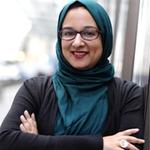Huda Fahmy on Her Arranged Marriage Journey – Lessons of Love, Laughter & Valuing Oneself
Lifestyle
|
Mar 12, 2020
|
10 MIN READ
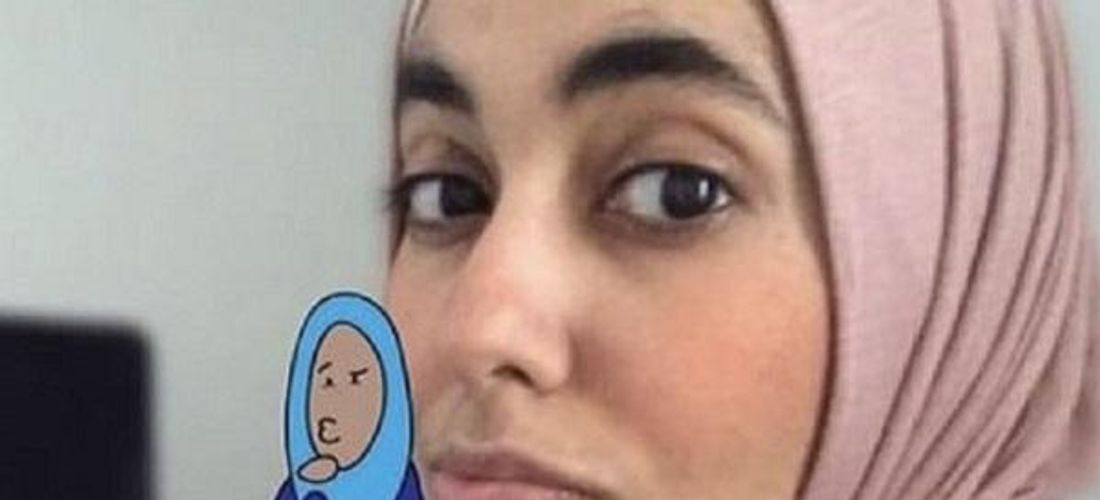
Huda Fahmy always wanted to tell her story through the lens of humor, so she created an iconic cartoon alter ego (also named Huda), dressed in a blue abaya and a perpetually turquoise blue hijab, to help her do it! Her "Yes, I'm Hot in This" web comic series (and first book) has us all in doubled over with laughter and solidarity over all the hijabsplainin', micro-aggression fighting, Susan-enduring (if you've read her stuff, you know what I'm talking about!) and family bantering that bursts forth from the comic panels.
Her newest book, That Can Be Arranged, has just come out and chronicles her Jane Austen-ian journey to marriage, through which she learned to love and value herself. As she told me, "This is a love story. But more than that I want people to see that getting married doesn't mean you have to sacrifice yourself or your faith." I spoke with Huda about why she turned her comedic spotlight on her marriage story, the value of asking questions of oneself and any potential suitor and why her mom is the most iconic of characters! Oh, and of course we talked about her husband, Gehad, too :)
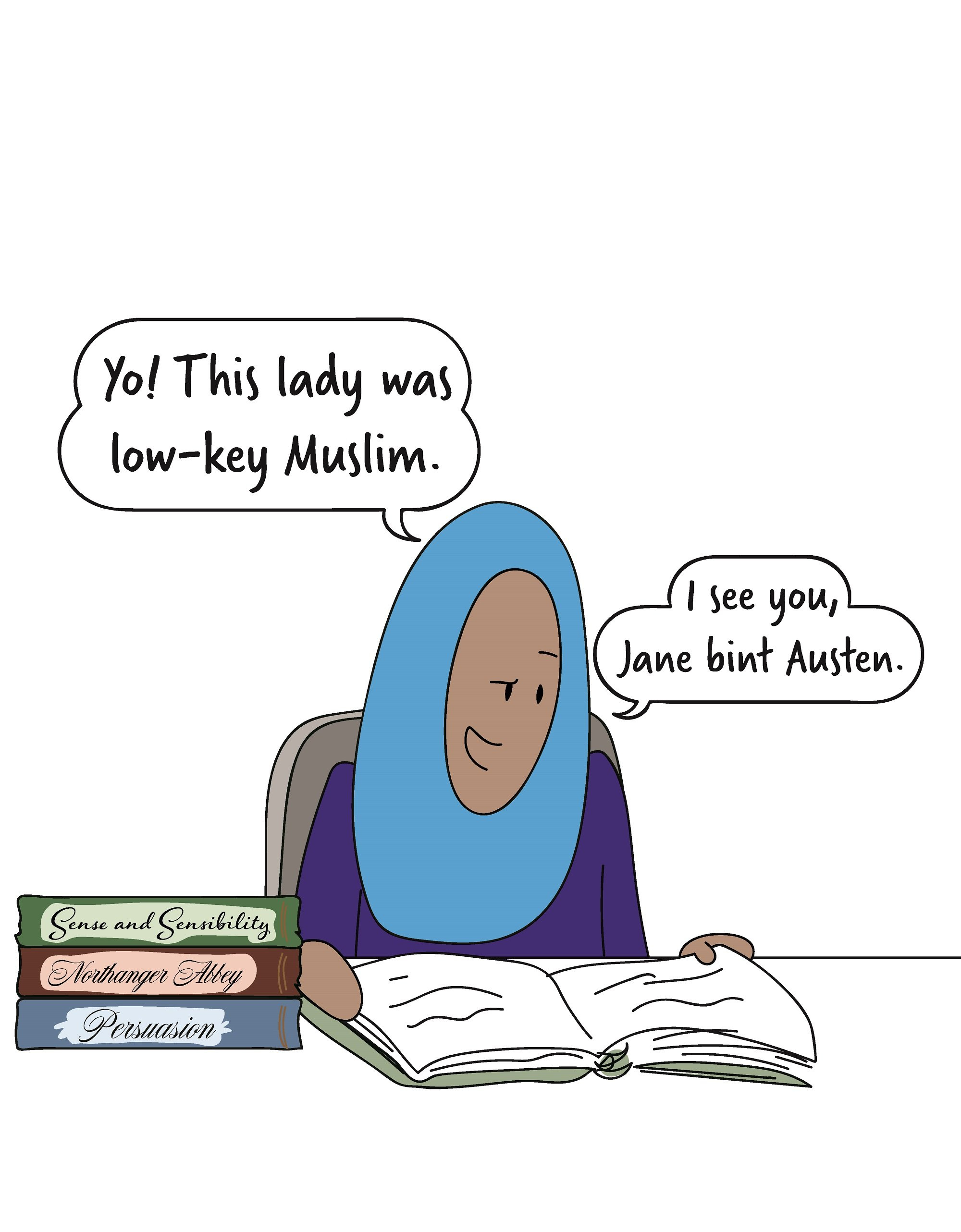
Huda learns that the arranged marriages she has grown up with is pretty similar to a Jane Austen novel in That Can Be Arranged; Image source: Huda Fahmy
Was there an “aha” moment that made you want to start writing about these real-life experiences in a comedic way?
There was an “aha” moment! So, I was writing [humorous] essays about being Muslim and posting them online. My older sister was having an event and [asked] me if I could turn one of my essays into a comic. She said, “I see these stick-figure comics at bookstores, and they do well. Why don’t you do that?” So, I did!
I always wanted to tell my story through the lens of humor – it was always a part of me. I would tell my parents about my day in a way to make them laugh; it was something I’ve always done. I love making people laugh, but more so I like making people think and laugh.
So many factors came into creating [my comic characters and story telling] into what it is now. [For example], I always loved the Sunday [newspaper] funnies. Garfield taught me how to speak English! My mother and father were Syrian and Egyptian [respectively], and my dad was working all the time. My mom was talking to us only in Arabic, and we went to a private Islamic school in the beginning. When we started going to public school, we didn’t know a lick of English. So, I started reading comics.
They were short and easy to understand, and they were hilarious! Garfield was the first thing I read, and then Calvin and Hobbes. I learned so much about how to tell a story from Calvin and Hobbes. Even before this whole thing started, I was following a million comic book artists on Instagram.
Of all the topics you’ve focused on in your work, why did you want to write about your arranged marriage in this book?
Have you ever experienced something in your life where you could trace it all the way back to your childhood and the development of your life led up to this? Like it was a thread in the back of your mind, and you’re curious to see where it’s going to take you, where it’s going to lead you? For me it was about how and where I was going to meet my husband.
The book is a journey of me from my childhood to my teenage years, my first proposal to [finally] meeting Gehad. This is a story about a girl who finally realized she was worth waiting for. It comes from a strong desire to see a love story where the girl didn’t have to sacrifice any part of her faith or herself. And, I wanted it out there because [other] people might want the same thing, and they may not know that arranged marriages can look like this.
You were an English major. But were you also into art or drawing? How did this become your full-time passion?
I was interested in it, but I wanted to specifically draw cartoon characters, not anything else. I never thought I could pursue it seriously. But in seventh grade I drew comics for our school newspaper, so there is that!
I knew this was what I wanted to do, but I started reading sheikh opinions on how we’re not allowed to draw comics/people. Then I asked another sheikh about it, and he was like, “Do you really want me to tell you the answer to your question?” So then I asked more sheikhs and scholars, and they said that for the sake of education, it’s good. I hope there is barakah (blessings) in [my work].
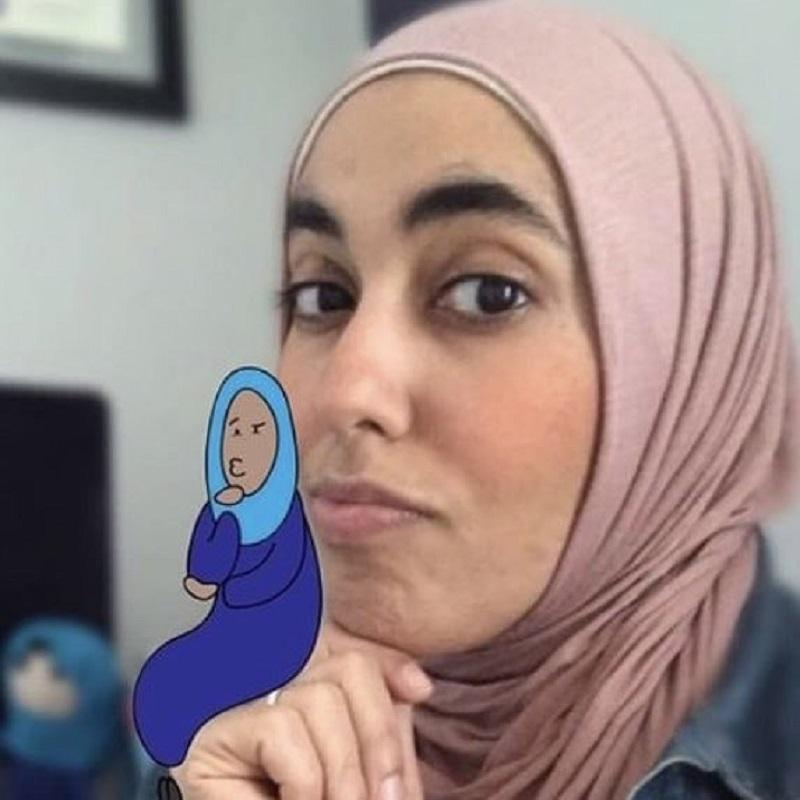
How are arranged marriages similar or different from other types of marriages?
Every marriage story is so interesting, and I don’t understand why we put so many limits on how we find the one we end up with, the one we want to marry! The most common, or old-school, form of arranged marriage is two people who never spoke, never met and then arrange to get married. Some people find that crazy, but there are some long and happy marriages that start this way.
[I think] it’s crazy what we’re asked to expect from two consenting adults in marriage nowadays. I want to open people’s eyes to their biases. You’re okay with blind dates or sex on the first date that is consenting. But if you consent to marriage [without intimacy or prolonged “dating” before hand], that’s crazy. Well no, it’s not. I don’t know why people don’t open their eyes to these kinds of [arranged marriage] relationships.
And, there is a distinction between forced marriage and arranged marriage. People need to know that. Also, domestic violence exists in all kinds of relationships. That’s another stereotype that some people have, that domestic violence occurs more in an arranged marriage. That's not true.
Do you think traditional arranged marriages are the way to go?
I definitely think it’s a way to go, and if that’s how your family does it, that’s great. The idea of community was much stronger when I was growing up, and everyone kind of knew everyone else and their business. You could ask around and get an idea about who this person is and the facts about them. It was a good filtering system [most of the time] having community aunties and uncles, who you trusted, look into someone for you. I don’t know if it’s the same anymore, and so I don’t know if “traditional” arranged marriages are [feasible] to expect or do.
I think about my son, and I don’t know how it’s going to be. Will he come to me and say, “Mamma, I’m ready to get married,” and then I’ll help him meet someone? Or will he say, “Mamma, I know this girl from the masjid. Can you meet her family?” I don’t know how it’s going to work.
Do you think there has been a generational shift in the way Muslim women value marriage?
Yes, I think so. For a lot of women [my age or older], growing up, it was a lot about getting married. Now it’s about getting your education, and then you can think about marriage. Now, this is generalization because there are women who want to get married [earlier in life], and that’s fine. And, [there are women] who want to go to school and get married, those who want to finish their education before marriage. That all works.
More girls are scared of who their parents will pick for them [and would rather choose themselves]. As long as you do it halal-style, it’s fine!
What advice do you have for young women who are interested in marriage? So many talk about the difficulty in finding a good partner.
There’s a list of 100 questions in ten categories, ten questions each from a presentation given by Sheikh Yaser Birjas called “Love Notes.” If you answer those questions yourself first and then think about how you’d want your ideal partner to answer those questions, it’s helpful. Gehad also asked me questions from this list. [Editorial note: Check out our post on 100 questions to ask a potential marriage partner.]
I [asked myself these questions because] I wanted to know what I wanted in a partner. This was a HUGE pivot for me. I was always so romantic, and I still am, but I was very naive in thinking that a guy wanting to marry me [was all I needed].
You have to know a lot of things ahead of time in order to live together. [You have to] know what your red flags are, and know what you’re looking for. Considering someone [for marriage] because they look good could be a total backfire on you if they don’t answer your questions truthfully and in a way that speaks to you. Use these questions as a springboard to figure out what you want, not just in marriage but from everyone around you. My mistake was in thinking it was only about how men treat me and not how everyone treats me.
You write about how you had a lot of faith in that Allah would bring you the right partner for marriage. How did you hold onto that faith?
I had to learn it the hard way. Every time I tried to force a man on my parents, it would backfire in the worst way. One time I told the sister of the guy [I was interested in] to tell him to wear a thobe (a long floor-length tunic for men) when he came to ask for me to my dad, because my dad loves a thobe, and it’ll look so nice. I wasn’t supposed to do that, because my parents said to leave it alone. My dad came back from meeting with this dude and said, “Can you believe this idiot wore a thobe? What kind of a guy wears a thobe to a coffee shop?”
So I stopped meddling. :) Even the sheikh who introduced me to Gehad wanted me to talk to him at the conference we were at, but that was something I knew my parents would not want me to do. So I didn’t do it.
Knowing, 100 percent that no matter what you do, Allah (S) has written out your destiny for you is how we can keep faith. Sometimes if Allah (S) doesn’t want you to get married, He’s protecting you from something. He’s saving you from something.
I try to do what is halal and trust in Allah (S). He will always have your back and do the best for you. I have two sisters who are not married, and they are amazing. Just amazing. And Allah (S) only knows [what is best for them].
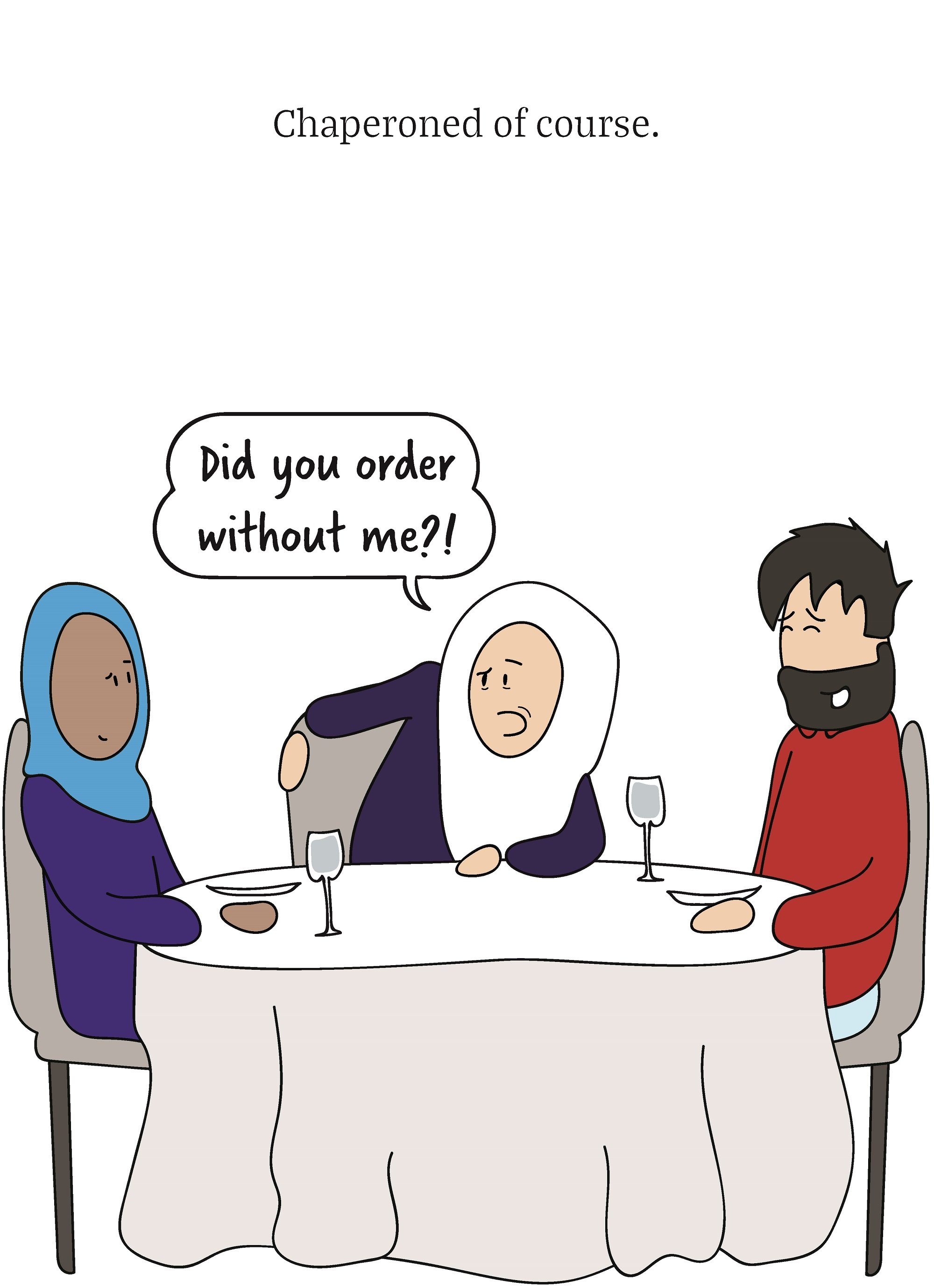
You write about a suitor you had who stalked you, and how you learned to value yourself through. How can young women combat similar situations?
I thought I was never going to get married. The first person who showed interest in me, it was flattering. But he was so toxic. It was my first time experiencing something so toxic. He said to me, “I want to see you angry. What makes you angry?” I had an anger-management problem, and I was proud of myself for working on it. But I said, ”When people insult my family or my sister, that makes me angry.” So, he immediately started insulting my sister.
I was just baffled. Why would he do this? [That suitor taught me that] I had to value myself more than value wanting to get married. [You have to learn to] trust yourself. When little things in your gut ping, make a note of it. Don’t tell yourself, “He's not going to be like this when we’re married.” Tell yourself, “I’m worth it. I’ll be my own best friend.” So [in regards to that toxic suitor], I prayed istikhara, and I woke up the next day and decided I was going to end it. My dad also hated the guy, and he’s a good judge of character.
I was 23 when that happened, and that was when I started to trust my parents a lot more. They really do know what I like and what I don’t like.
What kind of change (if any) do you hope to make by sharing your story? Why did you decide to share your story?
A big part of it is [about] representation and being able to tell my stories without seeing people cringe. The more we tell these kinds of stories, we dispel these myths and get rid of the taboos. Everybody that has this idea of what marriage is supposed to look like. People don’t even realize that they have biases. With globalization, we are all neighbors now. It’s about time you learned a little bit about your neighbor.
I remember growing up thinking there is something wrong with arranged marriages because i had a Western idea of what relationships were supposed to look like. Why do I hate my own culture? But change is slowly happening; we’re seeing more diverse stories being shared, and we get to see them in a light that we haven't seen before.
Your mom seems iconic. Is she like that in real life?
Totally! She’s full of wisdom, Masha’Allah. She’s such a character, and she loves being a character. She hasn’t read [my book] yet. I didn’t want her to read it until it came out, because if she says she doesn’t like something, then AAAAHHHHH! She would've censored me!
Your comic alter ego Huda wears the same hijab and abaya in your stories. Ever think of changing it up? Can we put her in a Haute Hijab? :)
She wears the same abaya and hijab in most every panel for the same reason that Bart Simpson, Homer Simpson and Lisa Simpson never change their clothes. It’s just easy for illustrators to keep them consistent, and it’s easy to identify them. That’s the obvious reason. So, I do the same with [comic character] Huda’s mom, same with Gehad. About putting her in a Haute Hijab – let’s talk!
Subscribe to be the first to know about new product releases, styling ideas and more.
What products are you interested in?

